Trudy J. Morgan-Cole's Blog, page 24
October 15, 2022
We Should Not Be Afraid of the Sky, by Emma Hooper
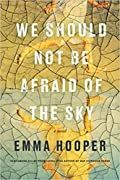
Of all the half-told, half-obscured women’s stories that come down to us from history and legend, some of the hardest to make into compelling fiction for modern readers are probably the lives of the saints — particularly those obscure “virgin saints” of the early Christian era who suffered martyrdom rather than submit to marriage and sex. In this novel, Emma Hooper takes the tale of Saint Quiteria, a Portuguese 2nd century martyr, and weaves it together with other traditions and saints’ tales, including one that says that Quiteria was one of a set of nonuplets, all beautiful young women who converted to Christianity and were martyred for their faith. The result is a rich, image-soaked novel that feels more like mythology or fantasy than historical fiction — appropriately, since saints’ tales are generally full of the kind of miracles and unlikely occurences that take us out of the realm of realistic fiction.
The Sea Between Two Shores, by Tanis Rideout
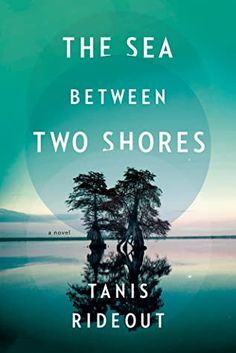
This intriguing novel juxtaposes two modern stories with one historical one; two families and two tragedies linked by the larger tragedies of colonialism and climate change.
In Canada, Michelle Stewart is still overwhelmed by grief after the accidental drowning death of her son Dylan — so much so that a year later she is unable to connect with her husband or her two surviving children or move forward in any way.
On an island in Vanuatu, a world away, Rebecca Tabe and her husband David are also grieving the loss of their son — their infant, Ouben, died after being unable to get adequate medical treatment for an illness after a devastating cyclone disrupted transportation, communication, and health care on their island.
What links these two families is that several generations earlier, Michelle’s ancestors, William and Josephine Stewart, came to the Tabe’s island as Christian missionaries. In the flashback historical chapters, we see their arrival and impact on the island through the eyes of a young woman named Faina who is an observer and participant in the tragic end of this missionary experiment. In the present day, David Tabe reaches out to Michelle Stewart and invites the Stewart family to come to the island for a ceremony of reconciliation. Every member of both families is impacted by the encounter, especially the Stewarts’ surviving teenage son Zach, who has been torn apart by conflicting emotions around his brother’s death. However, the author never loses sight of the fact that this is more than just a story about two families’ personal experiences of grief and loss. This is highlighted in a devastating scene where Rebecca gets angry with Michelle and points out that the loss of Rebecca’s son is considered by most people to be far less of a tragedy than the death of Michelle’s child — that the deaths of children in developing countries due to poverty, inequity, and and the unequally distributed effects of climate change, are considered acceptable losses by most people in Western countries.
This is a story that presents beautifully detailed and believable sketches of all its many characters, while at the same time posing big questions about culture, colonialism, and what “reconciliation” really means — as well as intimate personal questions about how we cope with and attempt to move on after terrible losses. It offers no easy answers. This was a very compelling read for me.
The Vanishing Half, by Brit Bennett
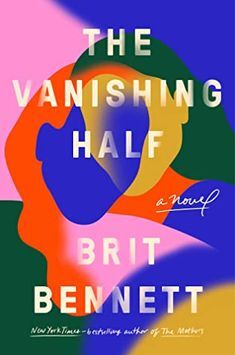
This was a quick and very engaging read about twin sisters growing up in a southern town populated entirely by Black people — but Black people who pride themselves on how light-skinned they are. And these two girls, Desiree and Stella Vignes, are not only smart, and ambitious, they are very light-skinned and thus considered very beautiful by the standards of their community. (The “colorism,” as it’s sometimes called, within African-American communities that privileges lighter skin over darker and is, of course, an outgrowth of the larger issue of racism, is a major theme in this novel and was a little shocking to a white reader like me who’s unfamiliar with Black American culture in the South). After the girls run away from home to find new lives and new opportunities at age 16, Stella discovers she can “pass” as white in a place where no-one knows her, and cuts all ties with her family and her past in order to reinvent herself. She pays a heavy price, psychologically and in other ways, for living a lie.
Desiree, meanwhile, ends up back home as a single mom raising her daughter who, because of Desiree’s short-lived married to a darker-skinned man, is much darker than her mother. In the next generation, the mystery of missing Stella and the long lie she’s been hiding comes unravelled as Desiree’s and Stella’s daughters meet each other. An important subplot here is the relationship that Desiree’s daughter, Jude, enters into with a transgender man, which allows the author to explore the ways in which both race and gender define or do not define who people are.
I found this novel easy to get immersed in. It was a quick read but gave me a lot to think about.
The Last Queen, by Chitra Banerjee Divakaruni
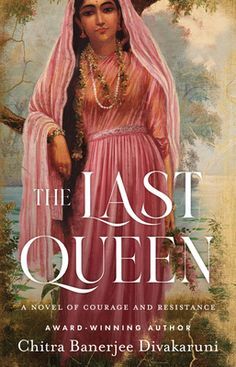
It’s always great to read about amazing women from history that aren’t the ones I already know from my own English history. This novel is about Jindan, one of the wives of Maharaja Ranjit Singh, ruler of the Sikh Empire in the early 1800s. Jindan’s young son, Duleep, briefly becomes king with Jindan as regent, in the power struggles after Ranjit Singh’s death. Looming over these internal power struggles within the Sikh Empire is the constant threat of the British Empire and its bid to rule all of the Indian subcontinent — which, as we know, they eventually succeeded in doing, at least for awhile.
Because it’s history, we know Jindan’s struggle to see her son rule over an independent kingdom as his father had done is going to be a doomed one; however, there’s a lot here I didn’t know and the book had me flipping back and forth between it and many Wikipedia pages about Jindan and her son. Their story is fascinating, both in the novel and in real life, and is interlaced with that of a jewel we heard a lot about during the recent ceremonies around Queen Elizabeth’s death — the Kohinoor diamond, which Duleep Singh gave to Queen Victoria and which Pakistan, India, and Afghanistan all claim rightfully belongs to their countries rather than being embedded in the British Crown Jewels.
The only quibble I had with this novel was with pacing. Jindan’s early years — her childhood, her early marriage to the already-elderly king, and the events leading up to his death — are portrayed in wonderful detail. But once the events where she is at the centre of the action began — when the king dies and the struggle over his succession, and the struggle to keep the Punjab free of British rule, actually starts — so much is happening that those events, and the later years of Jindan’s life in exile, feel rushed, almost as if they’re being summarized. Particularly during the bloody and brutal times right before and during Duleep’s short rule, when betrayals and assassinations are happening almost too quickly to keep up with, the body count feels almost numbing for the reader and left me wondering how it felt for the people going through it. I sometimes have this thought when reading historical fiction set during particularly bloody periods in history (the French Revolution comes to mind as well) — do people become inured to that level of trauma? Most of us would be deeply traumatized by seeing even one body of a person who had been brutally murdered, especially if it was someone we knew: what’s the impact of seeing that over and over for months or even years? I felt distanced from Jindan’s perspective during those events (even though the story is still being told in first person) when the earlier chapters had been so vivid and immersive. But despite those small quibbles this was a fascinating story to read and learn about.
September 22, 2022
Ducks: Two Years in the Oil Sands, by Kate Beaton

I knew of Kate Beaton as a Nova Scotia artist who was the genius mind behind the weird and brilliant historical and literary comics Hark! a vagrant. I was excited to see she was coming out with a memoir in the format of a literary novel, even knowing it would be something very, very different from Vagrant.
The subject matter is familiar to anyone who’s grown up in Atlantic Canada: having just graduated with a liberal-arts degree, young Katie Beaton can’t find a job in her field or in her area of study (Cape Breton; history) that will even come close to helping her dig out of her massive student-loan hole, so she heads to Alberta like so many East Coasters, picking up one of the plentiful jobs in the oil sands. There, she makes the promised money, but also sees first-hand all the things that make life in that place so hard: the isolation, the loneliness (especially when she moves from living in Fort Mac to working in one of the camps), the rampant sexism (and worse) experienced by the handful of women who live and work among these men who are so far from home. The toll on the environment; the toll on human mental health. All these things are depicted unsparingly, but so are the acts of kindness, the humanity, the fragile sense of community she encountered among the many men and few other women that she worked alongside there. Ducks is a coming-of-age memoir that also paints an unforgettable portrait of life in the industry that makes our world both possible and doomed, an industry we rely on and often revile but are generally glad (if we don’t work in it ourselves) to know as little as possible about. It’s that perfect balance of a deeply personal story set against the backdrop of a huge, complex, and very relevant story that impacts us all, and Kate Beaton’s words and pictures — which are inseparable from each other; I can’t imagine this book as a straight prose memoir — brings it all to awkward, uncomfortable, touching life.
The Year of Miracles, by Ella Risbridger
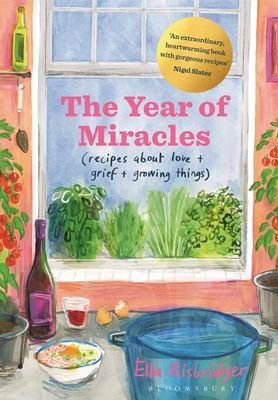
Recently I went to a bookstore and bought two hardcover new releases. You’d think, knowing how much I love to read, that this is a pretty common occurrence, but it’s actually not. While I am a voracious reader, most of the fiction I read is in the form of e-books, and most non-fiction in audiobooks, often borrowed from the library and well suited for rapid consumption. Books I love enough to own I normally buy in trade paperback, my favourite book format to look at and hold. I actively dislike the feel of most hardcover books in my hand, so rarely buy them.
However, Ella Risbridger’s new cookbook/memoir The Year of Miracles is one that I had to have in print, and I had no intention of waiting a year for it to come out in paperback (the same is true of the other book I bought at the same time, which I’ll review next; Kate Beaton’s graphic-novel memoir, Ducks). I’d already read Risbridger’s Midnight Chicken, another cookbook/memoir mashup: in the review of that one I explained how I came to know of Ella Risbridger and her work, and why it fascinated me. I did read that one as an ebook, but decided I would like to own it eventually in paper, and I had to get this one as soon as it came out, even though I don’t know how many of the recipes I’ll ever try. It’s beautifully illustrated and a joy to look at, another reason, apart from the recipes, that I wanted a hard copy. But the heart of the book is Risbridger’s essays which introduce each recipe, her chronicle of rebuilding her life after a devastating loss, leaning on a circle of dear friends for support, living through 2020’s pandemic year, and falling in love again — cooking all the while.
If you’re one of those people who hates it when recipe blogs introduce the recipe with a long personal story you have to scroll through to get to the instructions and ingredients, you’re going to hate this book, so don’t bother — it’s not really, or mainly, a cookbook. I love Risbridger’s voice, and her insights, and her thoughtfulness about grief, loss, and putting both a meal, and your life, together again.
The House With the Golden Door, by Elodie Harper
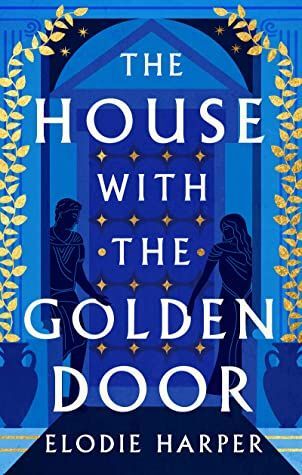
Although they are very different types of books, everything I said in my last review about Tasha Suri’s The Oleander Sword is relevant here — this, too, is the second volume of a trilogy, so it is not the place to start; the important thing to tell you about The House With the Golden Door is that it is a magnificent follow up to The Wolf Den, a tale of enslaved sex workers in a Pompeii brothel. At the end of that engrossing novel, our heroine Amara has experienced a change for the better in her circumstances — she is a wealthy man’s mistress, a courtesan rather than a slave, with a greater degree of freedom. But of course she is not completely free — and still has many enemies and faces many dangers. And the greatest of these dangers might just be falling in love.
There’s some really thoughtful exploration here of the institution of slavery in the ancient Roman world — what it meant to be enslaved, what enslaved people could and could not do, and how even as people chafed under the cruelty of that system, it was so ingrained in the culture that many newly-freed slaves became slaveowners themselves. Some people have criticized this series for sounding “too modern” but I feel like it does that only with language, making ancient places and customs feel vivid and real and reminding us of our similarities to them — such as when characters refer to the places that sell hot meals to the public as “fast food stalls,” which might not have been exactly the term they used in Pompeii, but does emphasize that people 2000 years ago had the same urge to pick up hot food they didn’t have to cook themselves, as we do today! (I did balk a bit at one of the characters referring to something as happening “on Wednesday” — since that’s a day of the week that’s tied very specifically to a mythology the Romans would not have known or used — but lapses like that are rare). What Harper does so well, though, is avoid anachronism where it really matters — in people’s thoughts or attitudes, particularly in the way they view the institution of slavery. It would be so easy to impose modern sensibilities on a character like Amara, but she is completely a woman of her time, even if she swears in modern English.
The setting is not just a beautifully evocative picture of the ancient world in the first century CE — it’s also quite specifically Pompeii in the mid-70s CE. This is a great setting because of course the author is able to draw on so much of the Pompeiian graffiti that’s been preserved, not just as chapter epigraphs but as windows into how people thought about prostitutes, slaves, love, sex, and power. It’s also a time setting with an obvious looming bit of foreshadowing of which the characters are unaware … and that I’m sure is going to play a key role in the third volume of the series.
Beautiful, vivid, so engaging and powerful — I love this series and can’t wait for book 3.
The Oleander Sword, by Tasha Suri
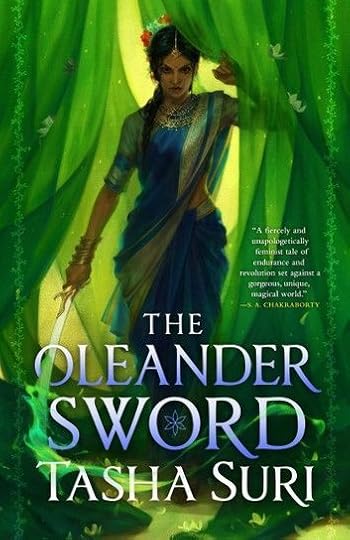
It’s hard to know what exactly to say in reviewing a sequel, because it’s either a satisfying and worthy follow-up to the original book, or it’s a bit disappointing. You can’t really tell people to dive in and read the second book in a series without reading the first (at least, I wouldn’t). So what I will say about The Oleander Sword is that it an absolutely satisfying, wonderful follow-up to The Jasmine Throne. Set in a fantasy-world version of the Indian subcontinent, this is a brilliantly realized, vivid, gorgeous world. Empress Malini, fighting for her throne, and servant-girl-turned-priestess Priya, her lover, are as compelling as ever; their relationship is tender and terrible and very fraught, and the dangers that menace both their homelands are terrifying. I am simultaneously so excited for the third book in this series, and also have no idea how Tasha Suri will resolve these storylines in a way that’s not completely tragic and heartbreaking (maybe it will be!). And that is about the highest praise I can give to the second book of a trilogy.
A Wayside Tavern, by Nora Lofts
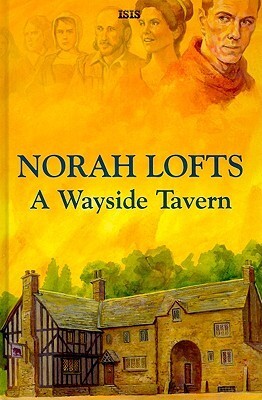
I came to this novel by a rather roundabout route. I had just watched the episode of Sandman (the new TV series based on the Neil Gaiman graphic novels) in which Death makes a deal with a man in 14th-century England who doesn’t want to die. Death grants him immortality on the condition that once every hundred years, the man will meet up with Death and tell him how eternal life is going. I loved the episode, and my favourite part about the whole concept was that they kept meeting up in the same location, which was a tavern in the 1300s and retained its nature as some kind of an inn/pub/etc throughout the centuries. Seeing how the tavern and its patrons changed over 700 years was one of my favourite things about the episode.
A day or two after I watched that, in a completely unrelated online conversation, someone mentioned this novel, which I’d never heard of, and of course I had to find it. The premise is that the same building on the spot in, I think, Suffolk, serves as some kind of a tavern or inn from the era when the Romans are pulling out of Britain, up to the mid-20th century. The story jumps forward a hundred years or more in each chapter, showing how the inn, the town around it, and the people running it (often descendants of the same family) change with the changing times. I loved the little glimpses into people’s lives and how they intersect with the larger stories of history, the details about the inn itself, the way unfinished stories from one time period would be referenced in passing as bits of family history years later, the tiny details that become memory and then legend — I just loved everything about this book. Great stuff.
The Nature of Fragile Things, by Susan Meissner

Susan Meissner, whose novel As Bright As Heaven was about the 1918/19 flu pandemic, has a gift for writing historical fiction about subjects that don’t get enough historical fiction written about them. (Seriously, I know every single thing about WW2 is fascinating, but it seems like in the past few years, 80% of the historical novels I see in bookstores are about the war, the Nazis, the Holocaust, the Resistance, the spies, the war, the war, the war … and it’s all fascinating and there are so many untold women’s stories from the WW2 era of course … but there are so many great untold stories from other events too!). This one is about the 1906 San Francisco earthquake, and a young Irish immigrant woman with a mysterious past, a hasty marriage to a mysterious stranger, a child in need, and an unlikely friendship with another woman who should be her enemy. In the midst of all this, the city is torn apart by the earthquake, and it’s both a fascinating bit of history and an apt metaphor for the upheaval of Sophie Whalen’s life. A really good read.



